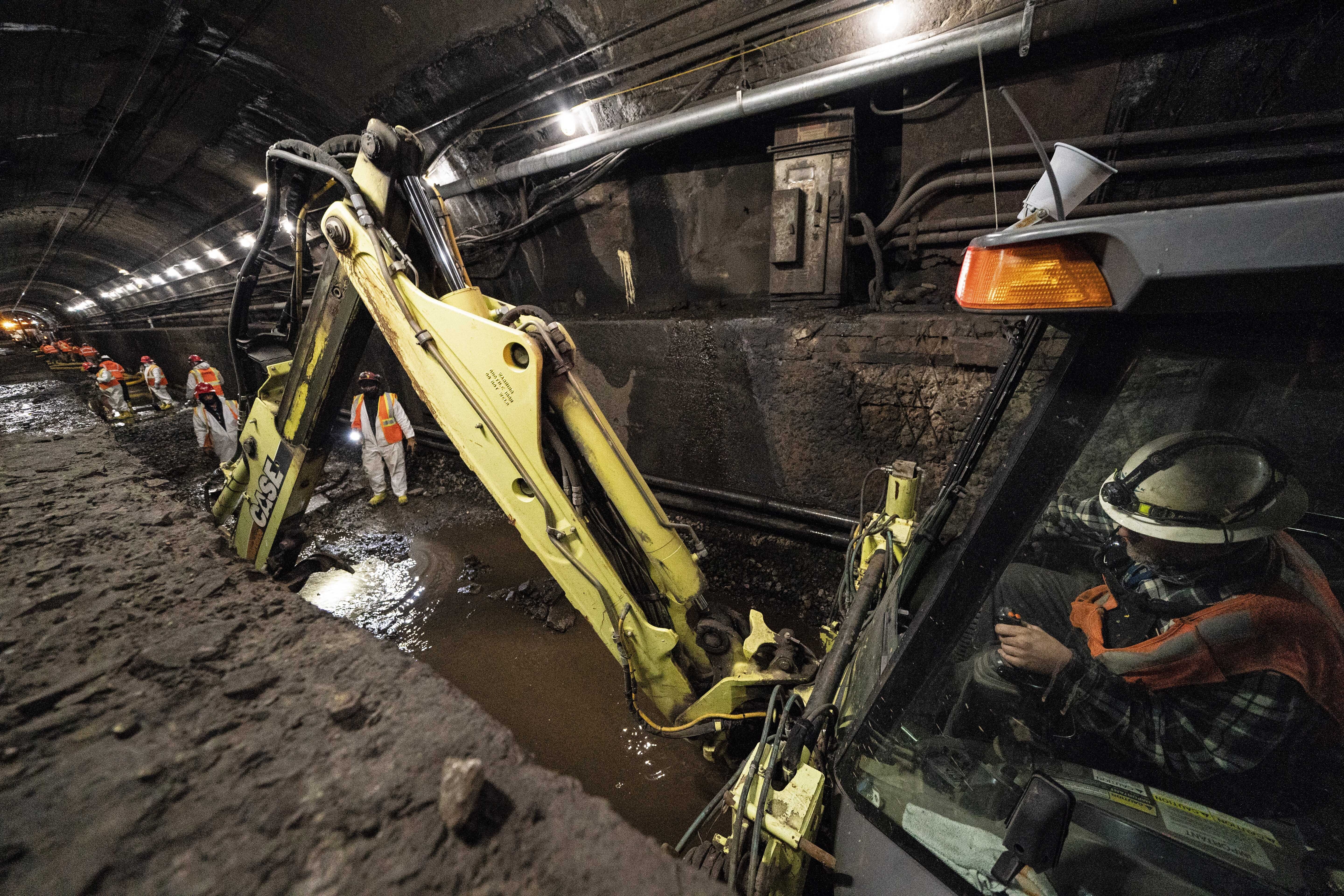Infrastructure Update: The Bill is Signed. What's Next?

President Joe Biden signs the $1.2 trillion bipartisan infrastructure bill into law during a ceremony on the South Lawn of the White House in Washington on Nov. 15, 2021. AP Photo/Susan Walsh, File

Connecting state and local government leaders
President Biden has signed the $1.2 trillion infrastructure law. Attention is now turning to states and localities, which will have a key role coming up with projects and implementing programs.
This is an archived version of Route Fifty's weekly Infrastructure Update newsletter. Subscribe here to receive the newsletter by email.
****
Hello and welcome back to Route Fifty's Infrastructure Update, I'm Dan Vock. This is a moment that many of you have been looking forward to for years – President Joe Biden on Monday signed a $1.2 trillion infrastructure package into law.
So, what's next?
Well, the funding, which includes $550 billion in new spending, won't be heading to state and local agencies just yet. How long it will take to arrive depends a lot on the specific programs that different pots of money are dedicated to. Getting the dollars moving will also likely require more action from the U.S. Department of Transportation, state legislatures and even Congress. Yes, you read that right: Congress isn't done yet.
Looking at The 'Long Game'
Biden's signature infrastructure legislation is a different creature than the Great Recession-era spending programs he oversaw as vice president. Instead of keying in on "shovel-ready" projects, the president and his supporters are talking about making improvements that could shape American society for decades. That takes time.

"We've got to look at the long game here. This is about a multi-decade return on investment," said Joung Lee, director of policy and government relations for the American Association of State Highway and Transportation Officials. "We want things to happen as quickly as possible, yes. But we have to be realistic, that a massive public works program like this is going to take some time to implement."
Time, however, is a precious commodity for Biden politically. Democrats are anxious to see meaningful results from the law soon, preferably before voters go the polls next fall to decide whether the party should remain in charge of Congress.
Expectation Setting at DOT
"The good news is that local communities have a lot of projects and are ready to start investing this money right away," Polly Trottenberg, DOT's deputy secretary, told reporters last week.
"We really hope that communities across the country will see the money pretty quickly, but I also want to be careful in setting expectations. This is a five-year bill, and some of the projects are going to take more time," she added.
Trottenberg also explained that taking some extra time with the law's rollout should give the department more room to work with smaller jurisdictions, so it's "not just the big cities and well-connected transportation agencies" that scoop up the competitive grants.
Different Paths for Different Dollars
Here are some things to keep in mind with how the funding in the law will be delivered to the state and local level.
New money for highways will be doled out to states based on formulas, so that funding will likely be some of the first out the door. The same goes for transit agency dollars. Competitive grants like the INFRA program for freight corridors and the multimodal RAISE program (previously BUILD and before that TIGER) are also likely to move quickly, according to Trottenberg, because DOT has been administering them for years.

But other parts of the law, like money to help remove or retrofit segments of highway built through minority communities, could take longer to ramp up. Trottenberg said that some of the new grant programs should be up and ready within six months.
Lee, from AASHTO, notes that there are a few other steps that could determine how fast the infrastructure money flows from Washington.
First, Congress has to pass a new appropriations bill to update the spending levels for current programs with the higher amounts in the infrastructure law. That could be taken care of as soon as early December, when the current spending authorization expires. But transportation is only one of many program areas likely to be included, so seemingly unrelated debates on things like abortion could bog down the appropriations process.
The new law does contain some provisions designed to speed up the distribution of funds.
For example, a new $5 billion program to help states install charging stations for electric vehicles includes a formula for divvying up the money. But if a state doesn't submit a plan to the federal government for how it is going to use its share, the U.S. transportation secretary can shift that money to localities instead. And if those municipalities can't spend the funding, it will go to other states that can.
State and Local Role
State legislatures may also have to get involved. New highway money, for example, will be distributed the same way it is currently: The federal government will pay for 80% of the costs, but state governments have to pay for the remaining 20%. If a state doesn't have enough money to cover its share, legislators could step in.
States and municipalities will also have to decide which grants they want to apply for. The infrastructure law gives an unprecedented amount of discretion to the Transportation Department to pick projects that match the Biden administration's goals, especially when it comes to reducing carbon dioxide pollution and building resilience against climate change.
"It's fair to say that all states will be interested in at least some of these discretionary grant programs," Lee said. "But I don't think every state will apply to every single program."
Staffing Up
Another issue for state and local officials to consider: The workforce. Researchers at the Brookings Institution pointed out that turning federal money into local infrastructure improvements will require more staff to keep the process moving.
"All three levels of government must be ready to hire for a sweeping set of occupations: budget experts, various construction workers and skilled tradespeople, conservationists and environmental engineers, and so on," Adie Tomer, Caroline George, Joseph W. Kane and Andrew Bourne wrote earlier this month.
"Human resource departments may need to grow just to make all the hires. Meanwhile, public agencies will be competing for scarce talent with the private sector," they added. "More good-paying jobs is a good thing, but it raises the urgency to expand the infrastructure-related talent pipeline."
That's it for this week's edition. If you haven't already, consider signing up here for Route Fifty Today, our daily newsletter, where you can stay up to date on the latest trends and best practices happening in state and local government nationwide. If you have news tips or feedback, if you want to share your community's story, or if you just want to say hello, please email us at: editor@routefifty.com. Thanks for reading!

NEXT STORY: Why we should insist on technology-neutral broadband infrastructure funding



